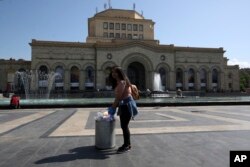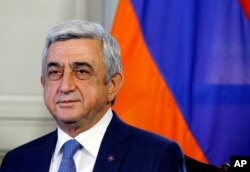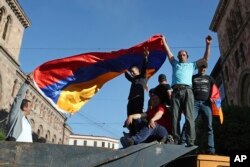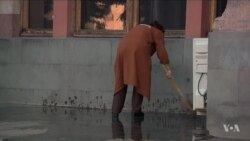The ruling Republican party of Armenia has indicated it will support the opposition leader Nikol Pashinyan’s bid to become the interim Prime Minister in a parliamentary vote scheduled for May 8.
The decision follows weeks of protests that forced the resignation of former Prime Minister Serzh Sargsyan and culminated in blockades and strikes. Republicans had blocked Pashinyan’s bid to become prime minister in a parliamentary vote on Tuesday, bringing protesters back onto the streets.
Pashinyan called a halt to the demonstrations Thursday as all sides try to negotiate a political solution. Speaking Thursday, the Republican’s deputy head, Armen Ashotyan, told reporters that his party would support Pashinyan’s candidacy, so long as he won at least a third of the votes in parliament.
“We had two criteria to assist any candidate. The first is a necessary threshold of the signatures, amount of signatures, and the second is to calm down the situation on the streets, not blocking the interstate roads, airports, etcetera. So, the man who could cope with this criteria is considered to be Nikol Pashinyan and in case — before 8 May — he keeps these two criteria as promised, as agreed, we will assist his election.”
If the May 8 vote fails to elect a prime minister, parliament will be dissolved and fresh elections will be called.
The protests erupted last month after Sargsyan was accused of manipulating the constitution to cling to power, fueled by frustration over poverty, corruption and poor governance.
The protests have been largely non-violent and appear on the verge of forcing a change of government.
“I have a feeling that I’m in another, new Armenia. And I am certain that the new government, the new leader will try to do his best for the people to have a decent living,” 40-year-old builder and Yerevan resident Seyran said Thursday.
The protesters lack any grand strategy but instead have used their power to demand change, says Lilit Gevorgyan of risk analysts IHS Markit.
“The next stage will be looking into the electoral law, to change it to make sure that the parties are real parties. Following that, there is an even bigger problem or obstacle or battle, and that will be holding free and fair elections,” said Gevorgyan.
Opposition leader Pashinyan has been the figurehead of the protests, but it is a grassroots revolution, argues Gevorgyan.
“People came out simply to protest and say that, ‘we don’t care who’s leading this movement, but we want to say that the system is failing to meet the basic needs of the state.’ Inability to rein in oligarchs, close the wealth gap, deal with the fact that every third Armenian is earning two dollars per day and is below the poverty line,” said Gevorgyan.
Outside Yerevan, that poverty is starkly evident. Sixty kilometers (37 miles) north lies the village of Lusagyugh. Locals say there is no work, only subsistence farming. A third of the houses are empty as families have gone abroad for work, mainly to Russia.
WATCH: Armenia Protest Leader on Course to Become Prime Minister
Among them was 20-year-old Samwel Zakaryan, who left his home village last year. Now he's back and studying at a technical school in Yerevan and he has barely missed a day of the protests.
“Many people participate in protests. I participate, too. Today I didn’t have time. Otherwise, I participate every day. We go to Yerevan and come back. Most of my friends are there now,” Zakaryan said.
Their protests could be about to put the opposition leader into the most powerful office of state. But with political and legal hurdles to overcome, analysts say this is likely the opening battle for Armenia’s future.









